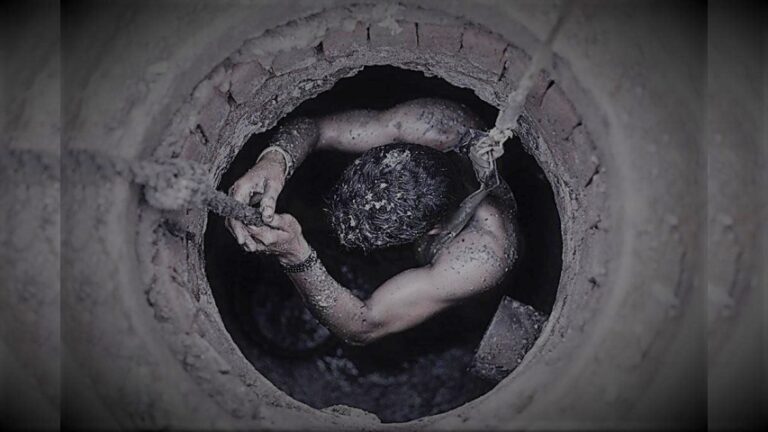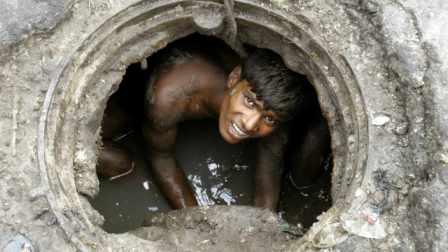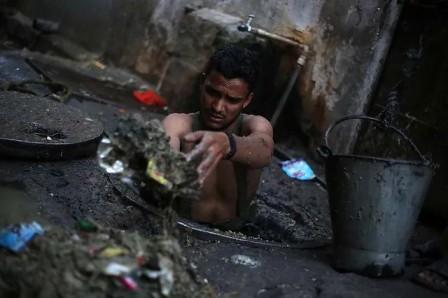

Deaths due to manual scavenging in the age of technological revolution, particularly after the advent of Artificial Intelligence, remain a blot on India’s growth story and the notion of the right to life with dignity. Despite being officially banned in India through various legislative measures, this practice remains a grim reality, as eight people recently died in Delhi and Uttar Pradesh due to manual scavenging.
The roots of manual scavenging in India are deeply entrenched in the caste system. Historically, this inhumane task was assigned to Dalits, particularly sub-castes such as Valmikis and Helas, deemed untouchable in the societal hierarchy. The rigidity of the caste system ensured that these groups remained confined to their roles, perpetuating a cycle of poverty and discrimination.
 According to government data, 339 people have died while cleaning sewers and septic tanks in India in the last five years. Ramdas Athawale, Minister of State for Social Justice and Empowerment, while responding to a question in the Lok Sabha recently, said nine such deaths were recorded in 2023, 66 in 2022, 58 in 2021, 22 in 2020, 117 in 2019, and 67 deaths in 2018.
According to government data, 339 people have died while cleaning sewers and septic tanks in India in the last five years. Ramdas Athawale, Minister of State for Social Justice and Empowerment, while responding to a question in the Lok Sabha recently, said nine such deaths were recorded in 2023, 66 in 2022, 58 in 2021, 22 in 2020, 117 in 2019, and 67 deaths in 2018.
Notably, manual scavenging is a banned practice under the Prohibition of Employment as Manual Scavengers and their Rehabilitation (PEMSR) Act, 2013. The Act bans the use of any individual for manually cleaning, carrying, disposing of, or otherwise handling human excreta until its disposal.
In 2013, India’s Supreme Court abolished manual scavenging and sought to correct the historical injustice and indignity suffered by manual scavengers. The SC directed states to do the same. In Delhi, the Arvind Kejriwal government bought 200 machines to take over the work of cleaning sewage. Yet, according to estimates, manual scavenging continues, and more than 50 manual scavengers died in Delhi in just the last five years.
Just when official data pegged the death of manual scavengers to one every five days since January 2017, the Safai Karamchari Andolan organization, working for the development of manual scavengers, released its official survey data, claiming that there have been 429 deaths due to manual scavenging in Delhi alone from 2016 to 2018.
In 2013, the government recognized 12,742 manual scavengers in 13 states, of which 82 per cent were in Uttar Pradesh alone. However, the 2011 census showed that 740,078 households across the country still depended on manual scavengers.
However, in 2021, the concerned minister told parliament that the government had identified 58,098 manual scavengers in the country through surveys but also added that there was no report of the practice of manual scavenging currently in the country.
But according to the Safai Karmachari Andolan, which works to eliminate manual scavenging, there are more than 770,000 such workers.
Any person or agency that engages any person for manual scavenging in violation of the provisions of the MS Act, 2013, is punishable under Section 8 of the Act, with imprisonment for up to 2 years or a fine of up to Rs. 1 Lakh, or both.
India has implemented several laws aimed at eradicating manual scavenging:
1. The Employment of Manual Scavengers and Construction of Dry Latrines (Prohibition) Act, 1993: This was the first significant legislation aimed at abolishing manual scavenging and the construction of dry latrines.
2. The Prohibition of Employment as Manual Scavengers and Their Rehabilitation Act, 2013: This act reinforced the prohibition of manual scavenging and introduced provisions for the rehabilitation of those affected, including financial assistance, alternative employment, and education.

Despite these measures, enforcement has been weak, and manual scavenging persists, often in one way or another. Many individuals engaged in manual scavenging are not aware of their rights or the existing prohibitions against the practice. Education levels are generally low, further limiting their opportunities for alternative employment. Poverty forces many to continue this work, as it is often one of the few employment opportunities available, despite the associated health risks and societal stigmas.
There is a significant gap between legislation and implementation. Local governments often fail to enforce laws strictly or provide adequate rehabilitation and support for those transitioning out of manual scavenging. The lack of adequate sanitation infrastructure, particularly in rural areas, necessitates manual intervention. Furthermore, mechanization of sewage cleaning is still not widespread.
The impact of manual scavenging on health is severe. Workers are exposed to harmful gases, infections, and diseases, leading to chronic illnesses and even fatalities. The psychological toll is equally devastating, as these individuals face constant discrimination and social ostracism, stripping them of their dignity.
There have been some remarkable contributions, individually and collectively, towards the eradication of manual scavenging. Bezwada Wilson, a campaigner for the eradication of manual scavenging through Safai Karamchari Andolan, was awarded the Ramon Magsaysay Award in 2016 for his instrumental role in eradicating and rehabilitating manual scavengers.
He told Punjab Today, “Deaths of manual scavengers are increasing year after year due to inadequate planning. Neither the Prime Minister of India nor any Chief Ministers have talked about them as if their lives do not matter to them. Even after 75 years of Independence, there is manual scavenging; it is a National Shame. After our advocacy and intervention, Parliamentarians raise the issue of manual scavenging, but the concerned minister tries to brush it aside by saying that there is no manual scavenging in India, and surprisingly, the Parliamentarian doesn’t even counter that.”
Regarding the legal status, Wilson said, “Almost 10 years ago, the Supreme Court directed all the States to abolish manual scavenging and take steps for the rehabilitation of such workers, but till date not a single line of the SC order has been implemented, and there is no provision for any kind of rehabilitation.

According to Ashif Shaikh, Founder and Director of Jan Sahas Social Development Society, who has rehabilitated more than 40,000 people from manual scavenging and other forms of forced labor, “It is a matter of national shame as long as even one manual scavenger exists in India.”
“At the NDTV Cleanathon ‘Banega Swachh India,’ seeing the inhuman plight of the manual scavenger, I had committed to buy 50 machines for them. Today I fulfilled that promise! 25 small individual machines and one large truck machine gifted to BMC,” Amitabh tweeted in November 2018.
The “Campaign for Dignity” (Garima Abhiyan) in Madhya Pradesh, India, has assisted more than 20,000 women to stop doing manual scavenging as an occupation.
Pragya Akhilesh is an investigative journalist who is credited with transforming the dialogue on sanitation workers. She is considered one of the biggest sanitation crusaders and is called the ‘sanitation woman of India.’
Bhasha Singh, a journalist and author of “Unseen: The Truth about India’s Manual Scavengers,” based on over a decade of research on the horrific plight of manual scavengers across eleven states in the country and their ongoing struggle for self-empowerment, said, “The book talks about the plight of manual scavengers. I traveled to various places and met many of these people. Despite various laws being passed against this inhuman act, nothing has really been done against it, and it is still prevalent in India.”
In 2018, a group of engineers from Kerala designed a spider-shaped robot that cleans manholes and sewers with precision, called Bandicoot. The robot, which takes 15 minutes to clean small sewers and around 45 minutes to unclog bigger ones, was developed by Genrobotics, a company founded by nine young engineers in Thiruvananthapuram. Also, researchers at IIT Madras have developed robots to clean septic tanks without human intervention.
Prof. Salim Engineer, Vice President of Jamaat-e-Islami Hind, who is an alumnus of IIT-Kanpur, expressed concern about the practice of manual scavenging even after 75 years of Independence, saying it is a question of the dignity of these manual scavengers and an inhuman act. The government should be more sensitive to their plight and should try to implement laws against manual scavenging.
“Judiciary should take suo-motto notice to ensure that the law in place is enforced strictly and those asking them to do manual scavenging should be penalized. As we are in the age of technical revolution, we should try to ensure that machines are used to avoid health hazards and loss of lives. Social organizations should come forward in this direction. Jamaat-e-Islami has always raised such issues and will continue to do so,” he said.
Stronger enforcement mechanisms are required to ensure that existing laws are implemented effectively. This includes regular monitoring and stringent penalties for violations. Also, comprehensive rehabilitation programs should be provided, offering vocational training, financial support, and education to enable former manual scavengers to secure dignified employment. Increasing awareness about the legal prohibitions and the availability of rehabilitation support is crucial.
 Community engagement and educational initiatives can help change societal attitudes and empower affected individuals. Investing in sanitation infrastructure and promoting mechanized cleaning solutions can significantly reduce the need for manual scavenging. Government and private sector collaboration can foster the development and deployment of such technologies. Grassroots organizations and NGOs play a vital role in advocating for the rights of manual scavengers, providing support, and pushing for systemic changes. Their involvement is crucial in bridging gaps between policy and practice.
Community engagement and educational initiatives can help change societal attitudes and empower affected individuals. Investing in sanitation infrastructure and promoting mechanized cleaning solutions can significantly reduce the need for manual scavenging. Government and private sector collaboration can foster the development and deployment of such technologies. Grassroots organizations and NGOs play a vital role in advocating for the rights of manual scavengers, providing support, and pushing for systemic changes. Their involvement is crucial in bridging gaps between policy and practice.
Advancements in technology offer promising solutions to the problem of manual scavenging. Mechanized cleaning solutions, such as sewer-cleaning robots and vacuum trucks, can significantly reduce the need for human intervention in waste disposal. Government and private sector investment in such technologies are crucial for a sustainable solution.
The eradication of manual scavenging in India is not merely a legal obligation but a moral imperative. It requires a concerted effort from all sectors of society to dismantle the structures that sustain this practice. Only through education, enforcement, innovation, and community support can India hope to end this dehumanizing practice and ensure a life of dignity and respect for all its citizens.
Manual scavenging is a grim reminder of the inequalities that persist in our society. While legal measures and technological advancements provide pathways to eradicating this practice, real change requires a collective effort to address the underlying social and economic factors.
By fostering a culture of dignity, equality, and respect for all individuals, we can move towards a future where manual scavenging is truly a relic of the past. No doubt, manual scavenging should be abolished in letter and spirit, but the path chosen must be a pragmatic one because scavengers should be provided with the opportunity to earn their living with dignity and pride. ![]()
__________
Also Read:
Dr. Manmohan Singh: A Hero Shy of His Own Greatness
‘Yahi Hai Mera Mama’ – A commentary on Lok Sabha Elections
AAP under scrutiny; Delving into poetic justice
Hai, Modi kitna bura hai! (Agreed. But…)
Relax, My dead body won’t trouble your shoulders!
Shilanyas was a mistake, but Rajiv was not aware of unlocking Babri

Disclaimer : PunjabTodayTV.com and other platforms of the Punjab Today group strive to include views and opinions from across the entire spectrum, but by no means do we agree with everything we publish. Our efforts and editorial choices consistently underscore our authors’ right to the freedom of speech. However, it should be clear to all readers that individual authors are responsible for the information, ideas or opinions in their articles, and very often, these do not reflect the views of PunjabTodayTV.com or other platforms of the group. Punjab Today does not assume any responsibility or liability for the views of authors whose work appears here.
Punjab Today believes in serious, engaging, narrative journalism at a time when mainstream media houses seem to have given up on long-form writing and news television has blurred or altogether erased the lines between news and slapstick entertainment. We at Punjab Today believe that readers such as yourself appreciate cerebral journalism, and would like you to hold us against the best international industry standards. Brickbats are welcome even more than bouquets, though an occasional pat on the back is always encouraging. Good journalism can be a lifeline in these uncertain times worldwide. You can support us in myriad ways. To begin with, by spreading word about us and forwarding this reportage. Stay engaged.
— Team PT


Copyright © Punjab Today TV : All right Reserve 2016 - 2025 |